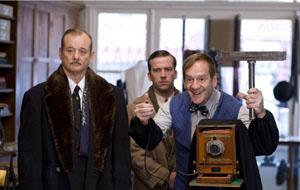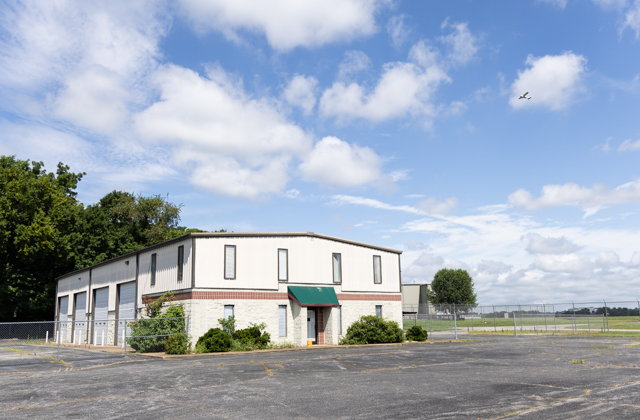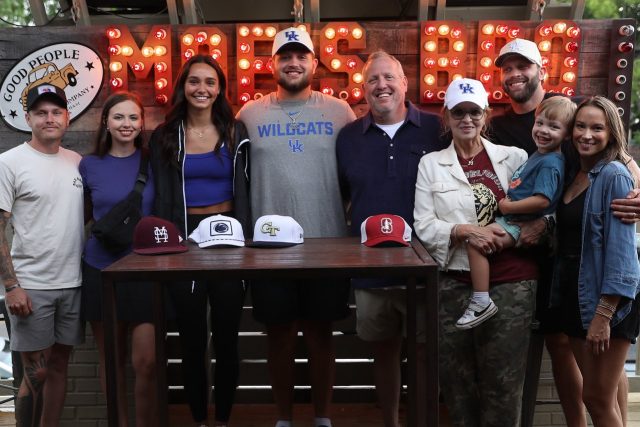Catching up with Andy Stahl
Published 12:00 am Tuesday, July 5, 2011

- Bill Murray, Lucas Black and Andy Stahl in a scene from Get Low, a Sony Classic Pictures release.
Living hundreds of miles away from our old Kentucky home seeing a young Butler countian make good in North and South was cause for celebration in my family. In the years since, I’ve followed Andy Stahl‘s career including several very memorable films in the last decade such as The Patriot, Glory Road, The Blindside and The Mist. So, recently when I spotted him in Get Low with Robert Duvall and Billy Murray, I knew I’d been slacking and it was time to catch up with the actor, musician and visual artist. He graciously consented to an interview concerning his three film projects in the works, his local band and a few surprises.
Q: The Lost Valentine aired earlier this year on CBS – can you tell us a bit about that experience? Betty White has become a cultural icon for yet another generation, did you have the opportunity to be on set with her and if so could you share that experience?
Trending
A: I didn’t get to meet Betty. I was only there for an overnight, and only on the set a half day. We shot my stuff in the Georgia State Capitol, and I had to be in Georgetown the next day to start shooting, The Bay. Jennifer Love Hewitt was very nice though, loose and easy going. Little hint that she was a producer.
Q: You have 3 films in post production in the thriller/horror genre. Most of your films have not been of this type, though you played a significant part in the Mist a few years back – can you comment about acting in this type of movie as opposed to dramas etc? From watching video extras, it appears actors have the most fun on these productions, do you find that to be the case?
A: Its all human emotion, but the beyond-natural situations do take those emotions to an extreme and those can be fun to get into. A beauty in acting, is that we’re able to go places, and be people that we would never be in real life. Whether we be portraying deranged villains, characters with supernatural powers, or submerging ourselves in different time periods and social classes, its all make believe heightened to an extreme. I think its fair to say that any adult would enjoy going back to their days of child’s play if it wasn’t deemed to be childish. My career expects me to do that, and its even received with respect and admiration if its done well. My bosses spend millions of dollars to help create an environment and situation for me and other actors to “go there”, and I’ve even been trained on how to get as self-absorbed with that journey as possible. Its a sand box of epic proportions, and the fact that so many have a certain envy of my profession, beyond the potential of fame and fortune, is proof to me that there’s still a child alive in most all of us. …But, of course, there’s a catch. 90% of my professional time is spent not doing that kind of work, but finding it. That part of the process is stressful and discouraging. I’m constantly in a struggle with rejection, and there’s no fun in that.
Q: You have a starring roles in both The Bay and particularly State of Emergency. Both seem to be apocalyptic in nature, The Bay with a ecological disaster and State of Emergency with an epidemic infection. Can you tell us a bit about these films and your experience with them?
A: I think the apocalypse is just “in” these days. The Mist was the same thing, and now Frank Darabont is currently in Atlanta starting a new season of, The Walking Dead which has been a hit. Horror, too, is ever present. I auditioned this week for a 3-D version of, “Texas Chainsaw Massacre”, and it noted that the character I read for would be seen in sequels.
You know as much about, The Bay as I do because they have been very secretive about the contents. I never saw a script for that project, and was given a complete change in scenes the day before I started shooting. 3/4’s of what I did on it was improv which I enjoy, I think, more than scripted material, and working with Barry Levinson was a real treat. He’s a pure and brilliant filmmaker, and he threw me lots of compliments, so it was very rewarding. I was a little afraid that The Bay might never see light of day, given that it was very low budget, and there are no box office stars in it as such, but I saw recently that Lionsgate has picked up domestic distribution on it, so it looks like it’ll be out there.
Trending
State of Emergency is an ultra low budget project shot by a couple of young brothers, John Will and Turner Clay, in Lexington. I grew up and went to school at College High with their mother, Alice Elrod Clay, and have watched her boys grow up as well. I got a call from them on a Friday, they had lost an actor in the last minute, and they asked me if I would come up the next day and do this part. I did, and we knocked it out in one long day. I have no idea what the future holds for, State of Emergency, and I haven’t seen it yet, but the Clay Brothers may well be a name you’ll hear more in the future. They’re brimming with enthusiasm and energy, not to mention talent, and they were a delight to work with for that reason. Alice, by the way, is the daughter of Western’s Hall of Fame football Coach from the past, Turner Elrod.
Q: Is it rare that directors allow that much improv? It seems like that would be hard to do knowing so little about the movie overall, how do you prepare for that?
A: I think I’ve seen more of it lately. Improv’d “Get Low” also. Many years prior to that, Altman was my other most memorable improv experience. I enjoy it, but you’re right, its nearly essential to have a clear understanding of the storyline and character. Otherwise, you’re shooting in the dark. In The Bay, the situations were simplistic enough that Levinson just told us some specific objectives and situations. He seemed pleased with the results.
Q: Poison Karma seems to play everywhere, how is that going for you? How are you able to balance so much?
A: The band has been a journey back to my past, my twenties, and parts of it have been good. There’s a lot of talent in the band, and its been good to rediscover a craft, playing bass, since my bass has literally been in the case since 1981. Still, the late nights, the volume and various other head trips, and loading equipment in and out in the wee hours of the morning have me rediscovering parts of my past that I don’t miss a bit, and could easily do without. That’s exacerbated by the fact that the pay for musicians has eroded to such an extent in Bowling Green, that its really not worth doing, even as a hobby. When I was playing clubs around here in the 70’s, you could make a decent living at it. Now, for some obvious reasons and some that make no sense, it really costs money to work in bands. That’s too bad, because one of the reasons Bowling Green and its region has produced so many great musicians over the years is because it used to be modestly lucrative to play here. I’ve always tinkered with writing music, and it was my goal to get back into playing and then start writing more, but time has been short in coming, and I haven’t made the progress there I’d hoped for. Still, my plan is to keep trying a while longer.
Q: I heard that you are able to audition for roles now from Butler county. I see all the time how the internet has changed the music industry and opened new doors for independent artists can you share some insight on ways it has effected the film industry and your work?
A: I work the southeast region, mostly Atlanta, and Louisiana, and many actors like myself are really spread out down here, we live all over. It worked pretty good for years, but again, now, I have to figure $400 expenses just to go into Atlanta to audition. When a good average to book roles is maybe one in ten tries, you can see how the overhead can get over my head. Taping at home and emailing the audition to the caster is obviously cheaper, and I’ve booked some great roles off of tapes, but its not as effective as being in the room with the producers and directors, and the success ratio suffers. I keep hoping that the technology will improve more, even to the point that we can cast live via video conferencing services. Skype, for instance, is really not strong enough quality wise to handle the needs, but the more high end services could become workable if the costs of usage comes down.
Q: Do you play an active role in finding parts to audition for or are those leads all generated through an agent?
A: More and more I do, because more and more, regional agents in the south have become useless, more answering services than anything, and they’re not even good at that. Don’t get me started.
Q: Any other endeavors on the horizon you’d like to share?
A: Believe is or not, my main focus these days would probably be screenwriting. I’ve got two full lengths finished now, one in particular I’m very excited about. I’m working with a producer that I’ve worked with in the past, Tom Blomquist, and I’m hopeful this coming month, when his slate clears, that we’ll be able to see what we can get done with them.
Q: Any hints about the subject matter of your screenplays?
A: One’s a Bowling Green Civil War story, and the other is what I’m calling a mythical account of the birth of Rock and Roll, kind of a “Oh Brother Where Art Thou” meets “Johnny B. Goode”






